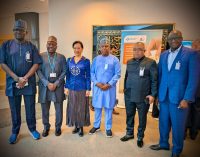A Chief Consultant Ophthalmologist, Dr. Festus Oshoba, has warned Nigerians against the use of breast milk and cow urine as remedies for eye infections and diseases, warning that such practices could lead to serious complications, including blindness, reports Business Today NG.
Osoba, who also described the trend as unsafe, explained that that applying unverified substances into the eyes introduces harmful bacteria, worsens infections, and delays access to proper treatment.
According to the eye expert breast milk, though nutritious for infants, is not sterile and is unsuitable for ocular use, while cow urine carries even greater risks due to its high microbial load.
He added that the use of such harmful remedies persists due to cultural myths and misinformation.
Oshoba handed the warning during the 26th Annual Faculty of Ophthalmology Lecture of the National Postgraduate Medical College of Nigeria, where stakeholders in Nigeria’s eye care sector converged to discuss on the challenges and solutions to achieving universal eye care in the country.
The ophthalmologists, described the practice as “force majeure” factors, adding that the usage of harmful substances often worsens avoidable conditions, urged individuals experiencing eye discomfort or infections to seek prompt medical attention from certified eye care providers.
“People should stop dangerous and unscientific eye care practices, such as the use of breast milk, cow urine, or the use of camphor in treating common eye ailments.
“People should protect their eyes from the sun’s harsh rays using sunshades or photochromatic lenses to prevent cataracts and other ocular damage,” he advised while speaking on the theme ‘Force Majeure, Masquerades and The Attainment of Universal Eye Care in Nigeria’.
He also warned against violence or corporal punishment involving the face, especially for children, noting that even a slap could cause internal bleeding and blindness.
Beyond physical safety, Oshoba stressed regular eye screening, adding that screening is key to early diagnosis and treatment of preventable and curable conditions.
“Use a calendar or chart at home to self-check your vision daily. The moment you can’t read what you used to see clearly, visit your doctor,” the ophthalmologist said.
Oshoba referenced cultural misconceptions and spiritual interpretations of blindness and eye diseases, such as attributing loss of vision to curses.
“Many of these cases are due to conditions like glaucoma, diabetes, or brain tumours, not spiritual attacks,” he explained.
He further advocated for increased computer vision care, especially for digital device users, and encouraged workers to get regular eye tests and corrective lenses to improve productivity.
Addressing a pressing systemic challenge, Oshoba lamented the acute shortage of trained ophthalmologists in Nigeria.
“We currently have just 454 ophthalmologists for over 220 million Nigerians. That’s grossly inadequate for universal eye care,” he said.











